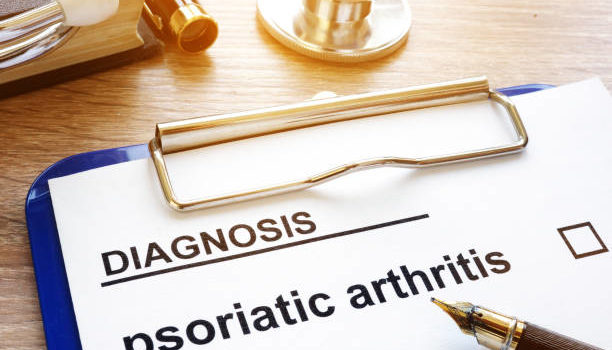
Psoriatic arthritis symptoms can start quietly—morning stiffness that lingers a little longer than usual, swelling in a finger or toe, or fatigue that doesn’t quite make sense. Over time, those symptoms can become harder to ignore.
Psoriatic arthritis is a chronic inflammatory condition that affects the joints and, often, the skin. Without treatment, it can lead to lasting joint damage.
While many people are familiar with osteoarthritis or rheumatoid arthritis, psoriatic arthritis often flies under the radar. According to the National Psoriasis Foundation, psoriatic arthritis affects about 1.3% of Black Americans, compared with 2.5% of white Americans—a difference experts believe reflects gaps in diagnosis and access to specialty care rather than true prevalence.
Understanding psoriatic arthritis symptoms and signs is one of the most important steps toward early diagnosis, effective treatment, and long-term joint protection.
Early Psoriatic Arthritis Symptoms
Early psoriatic arthritis symptoms are often subtle and easy to dismiss. Some people notice joint stiffness in the morning that improves throughout the day. Others experience mild swelling, fatigue, or discomfort in the fingers, toes, or lower back.
Because early psoriatic arthritis symptoms can resemble overuse injuries or aging, many people delay seeking care—allowing inflammation to progress silently.
Most Common Psoriatic Arthritis Symptoms
Most common psoriatic arthritis symptoms include joint pain, swelling, morning stiffness, fatigue, nail changes, and sausage-like swelling of fingers or toes.
These symptoms may appear gradually or flare suddenly and can vary widely from person to person.
RELATED: Psoriatic Arthritis Diet Made Simple: What You Need to Know
Psoriatic Arthritis Symptoms and Signs to Watch For
According to the U.S. National Institutes of Health, psoriatic arthritis psoriatic arthritis symptoms can affect multiple systems in the body and often occur in cycles, with periods of flare-ups and improvement.
Key psoriatic arthritis signs and symptoms include:
-
Joint pain, swelling, and stiffness, especially in the morning or after rest
-
Dactylitis, or painful “sausage-like” swelling of an entire finger or toe
-
Nail pitting, crumbling, or separation from the nail bed
-
Heel or foot pain, caused by inflammation where tendons attach to bone (enthesitis)
-
Fatigue that interferes with daily activities
-
Eye inflammation (uveitis), leading to redness, pain, or blurred vision
-
Psoriasis patches on the scalp, elbows, knees, or other areas
-
Inflammatory bowel disease symptoms in some people
Psoriatic arthritis symptoms in fingers and toes are especially common and often mistaken for injuries or other forms of arthritis.
RELATED: 10 Ways to Reduce Your Risk of Psoriatic Arthritis

What Does a Psoriatic Arthritis Flare Feel Like?
A psoriatic arthritis flare can cause a sudden worsening of symptoms, including:
-
Increased joint swelling and stiffness
-
Sharp or throbbing pain
-
Fatigue spikes
-
Worsening skin psoriasis
-
Reduced mobility
Symptoms of a psoriatic arthritis flare may last days or weeks and are often triggered by stress, infection, or changes in medication.
What Is Psoriatic Arthritis?
Psoriatic arthritis (PsA) is a chronic autoimmune disease in which the immune system mistakenly attacks healthy joints and connective tissue. The inflammation affects joints and areas called entheses, where tendons and ligaments attach to bones.
Psoriatic arthritis is closely linked to psoriasis. Most people develop psoriasis first, followed by joint symptoms—but some experience psoriatic arthritis symptoms before any visible skin changes, making diagnosis more difficult.
Diagnosis delays are especially common among people of color.
“Many of my patients receive late diagnoses, because people of color are less likely to see a specialist early on who can make a proper diagnosis,” says Dr. Ashira D. Blazer, MD, MSCI, a rheumatologist at Hospital for Special Surgery. “This can lead to more severe symptoms and a delay in starting effective treatment.”
Left untreated, psoriatic arthritis symptoms can worsen over time, leading to joint damage and reduced quality of life.
Psoriatic Arthritis vs. Rheumatoid Arthritis: Key Symptom Differences
Although psoriatic arthritis and rheumatoid arthritis share similarities, symptoms can differ:
-
Psoriatic arthritis often affects fingers, toes, nails, and the spine
-
Rheumatoid arthritis typically affects symmetrical joints and does not involve psoriasis
-
Nail changes and dactylitis are more common in psoriatic arthritis
Understanding these differences can help guide an accurate diagnosis.
RELATED: Psoriatic Arthritis vs Psoriasis: What’s the Difference?
Can You Have Psoriatic Arthritis Without Psoriasis?
Yes. Some people develop psoriatic arthritis symptoms before psoriasis appears. In these cases, joint pain, swelling, or stiffness may be the first warning signs.
Psoriatic Arthritis Causes and Risk Factors
Experts at the American College of Rheumatology believe psoriatic arthritis develops due to genetics combined with environmental triggers.
Risk factors include:
-
Family history of psoriasis or arthritis
-
Severe or widespread psoriasis
-
Obesity
-
Infections, including strep throat
-
Joint or bone trauma
-
Chronic stress
How Psoriatic Arthritis Is Diagnosed
There is no single test for psoriatic arthritis. Diagnosis typically includes:
-
Medical and family history
-
Physical examination of joints, skin, and nails
-
Imaging tests (X-ray or MRI)
-
Blood tests to rule out other conditions
Why Psoriatic Arthritis Is Often Missed in Black Patients
Psoriatic arthritis symptoms are often missed or misdiagnosed in Black patients. Psoriasis can appear differently on darker skin tones, making skin symptoms harder to recognize.
Joint pain and fatigue may be dismissed as stress, aging, or overuse. Limited access to rheumatology specialists can also delay diagnosis.
Culturally informed care, early referral, and patient self-advocacy are key to closing this gap.
RELATED: Psoriatic Arthritis Complications More Likely to be Found in Black Patients
This article is for educational purposes only and does not replace professional medical advice. Always consult a healthcare provider for diagnosis and treatment.
Treatment Options for Psoriatic Arthritis
Managing psoriatic arthritis symptoms usually requires a combination of medical treatment and lifestyle support.
Medications
-
NSAIDs
-
Biologic therapies
-
Corticosteroid injections (short-term)
Supportive Therapies
-
Physical or occupational therapy
-
Stress management
-
Heat and cold therapy
-
Water-based exercise
RELATED: Psoriatic Arthritis: 12 Tests You Need to Know About
When to See a Doctor
See a healthcare provider for psoriatic arthritis symptoms if you experience:
-
Swelling in fingers or toes
-
Joint pain with a history of psoriasis
-
Eye pain or redness
-
Symptoms lasting more than two weeks
FAQs: Psoriatic Arthritis Symptoms
What are the first symptoms of psoriatic arthritis?
Can psoriatic arthritis occur without psoriasis?
How do doctors confirm psoriatic arthritis?
Is psoriatic arthritis more common in Black patients?
Living Well With Psoriatic Arthritis
Living with psoriatic arthritis can be challenging, but early treatment and ongoing care make a meaningful difference. Many people successfully manage their psoriatic arthritis symptoms and protect joint health over time.









